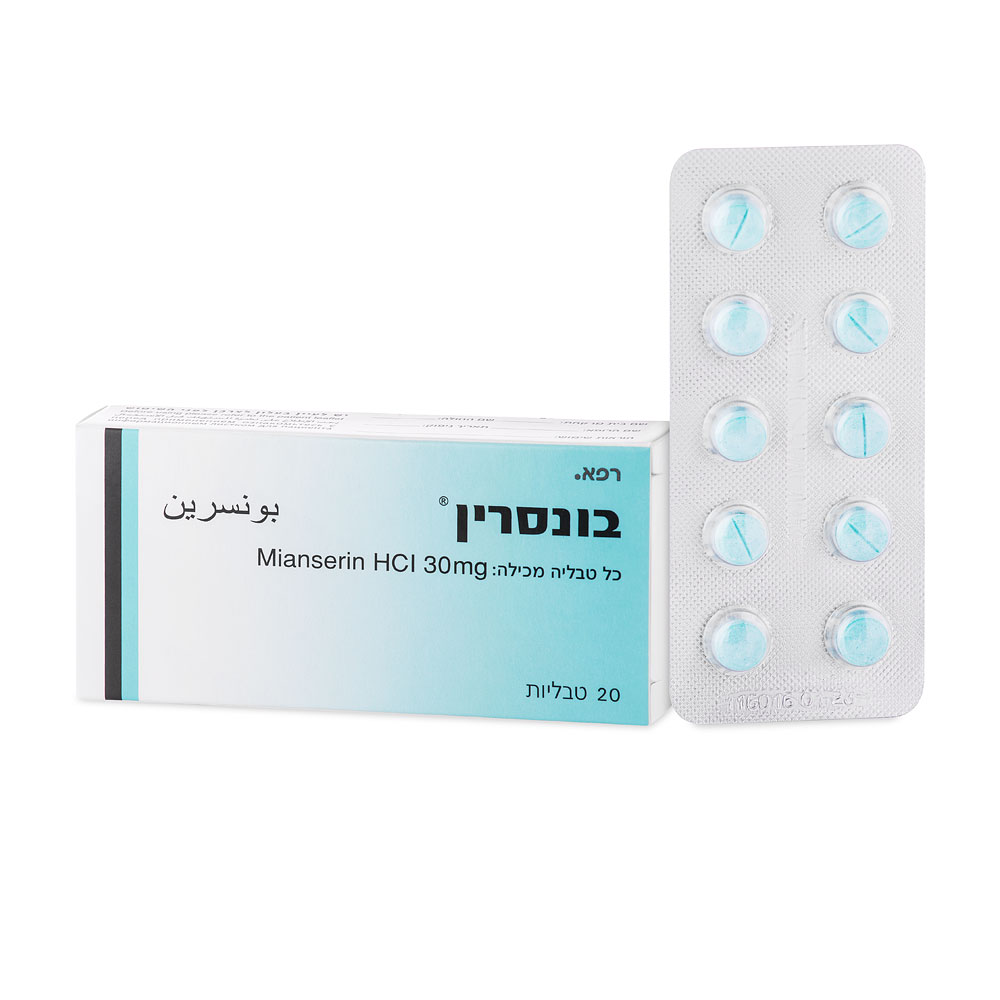Quest for the right Drug

בונסרין BONSERIN (MIANSERIN HYDROCHLORIDE)
תרופה במרשם
תרופה בסל
נרקוטיקה
ציטוטוקסיקה
צורת מתן:
פומי : PER OS
צורת מינון:
טבליה : TABLETS
עלון לרופא
מינוניםPosology התוויות
Indications תופעות לוואי
Adverse reactions התוויות נגד
Contraindications אינטראקציות
Interactions מינון יתר
Overdose הריון/הנקה
Pregnancy & Lactation אוכלוסיות מיוחדות
Special populations תכונות פרמקולוגיות
Pharmacological properties מידע רוקחי
Pharmaceutical particulars אזהרת שימוש
Special Warning עלון לרופא
Physicians Leaflet
Special Warning : אזהרת שימוש
4.4 Special warnings and precautions for use Paediatric population Mianserin should not be used in the treatment of children and adolescents under the age of 18 years. Suicide-related behaviours (suicide attempts and suicidal thoughts) and hostility (predominantly aggression, oppositional behaviour and anger) were more frequently observed in clinical trials among children and adolescents treated with antidepressants compared to those treated with placebo. If, based on clinical need, a decision to treat is nevertheless taken, the patient should be carefully monitored for the appearance of suicidal symptoms. In addition, long-term safety data in children and adolescents concerning growth, maturation and cognitive and behavioural development are lacking. Suicide/suicidal thoughts or clinical worsening Depression is associated with an increased risk of suicidal thoughts, self harm and suicide (suicide- related events). This risk persists until significant remission occurs. As improvement may not occur during the first few weeks or more of treatment, patients should be closely monitored until such improvement occurs. It is general clinical experience that the risk of suicide may increase in the early stages of recovery. Patients with a history of suicide-related events, or those exhibiting a significant degree of suicidal ideation prior to commencement of treatment are known to be at greater risk of suicidal thoughts or suicide attempts, and should receive careful monitoring during treatment. A meta-analysis of Ϯ placebo-controlled clinical trials of antidepressant drugs in adult patients with psychiatric disorders showed an increased risk of suicidal behaviour with antidepressants compared to placebo in patients less than 25 years old. Close supervision of patients and in particular those at high risk should accompany drug therapy especially in early treatment and following dose changes. Patients (and caregivers of patients) should be alerted about the need to monitor for any clinical worsening, suicidal behaviour or thoughts and unusual changes in behaviour and to seek medical advice immediately if these symptoms present. As an improvement in the patient’s depression may not occur during the first 2-4 weeks of treatment with mianserin, patients should be closely monitored during this period. Haematological and hepatic reactions Mianserin has been associated with haematological and hepatic reactions and patients require careful supervision. A full blood count is recommended every 4 weeks during the first 3 months of treatment; subsequent clinical monitoring should continue and treatment should be stopped and a full blood count obtained if fever, sore throat, stomatitis or other signs of infection develop. Cardiac effects Care should always be taken in patients with recent myocardial infarction, heart block or arrhythmia. Serious cardiotoxic effects appear to be rare at therapeutic dosage, even in patients with pre- existing cardiac disease, recent myocardial infarction or cardiac insufficiency. Use in older people Older people are less liable to experience adverse reactions such as agitation, confusion and postural hypotension with mianserin than with tricyclics or bridged tricyclics, but all anti- depressant therapy should be used with caution in this group of patients. Epilepsy As with tricyclic antidepressants mianserin is known to lower the convulsion threshold and should therefore be used with extreme caution, or avoided if possible, in patients with epilepsy and other pre-disposing factors e.g. brain damage of varying aetiology, concomitant use of neuroleptics, withdrawal from alcohol or drugs with anticonvulsive properties (e.g. benzodiazepines) (see sections 4.5 and 4.8). Diabetes, hepatic or liver impairment When treating patients with diabetes, hepatic or renal insufficiency, normal precautions should be exercised and the dosages of any concurrent therapy kept under review. Anticholinergic side effects Patients with narrow angle glaucoma or symptoms suggestive of prostatic hypertrophy should also be monitored even though anticholinergic side effects are not anticipated with mianserin therapy. Hypomania There are indications that mianserin, like other anti-depressants, may precipitate hypomania in susceptible subjects with bipolar affective illness. In such a case treatment with mianserin should be withdrawn. Surgery ϯ If surgery is necessary during mianserin therapy the anaesthetist should be informed of the treatment being given. Phaeochromocytoma Care should always be taken in patients with phaeochromocytoma. Lactose The tablets contain lactose. Each tablet contains 123 mg lactose monohydrate. Patients with rare hereditary problems of galactose intolerance, total lactase deficiency or glucose-galactose malabsorption should not take this medicine.
Effects on Driving

שימוש לפי פנקס קופ''ח כללית 1994
Antidepressant
תאריך הכללה מקורי בסל
01/01/1995
הגבלות
תרופה מוגבלת לרישום ע'י רופא מומחה או הגבלה אחרת
מידע נוסף
עלון מידע לצרכן
25.01.16 - עלון לצרכן אנגלית 25.01.16 - עלון לצרכן עברית 25.01.16 - עלון לצרכן ערבית 25.08.23 - עלון לצרכן עברית 08.02.24 - עלון לצרכן אנגלית 08.02.24 - עלון לצרכן עברית 08.02.24 - עלון לצרכן ערבית 08.08.24 - עלון לצרכן עברית 30.03.15 - החמרה לעלון 06.09.23 - החמרה לעלון 08.08.24 - החמרה לעלוןלתרופה במאגר משרד הבריאות
בונסרין